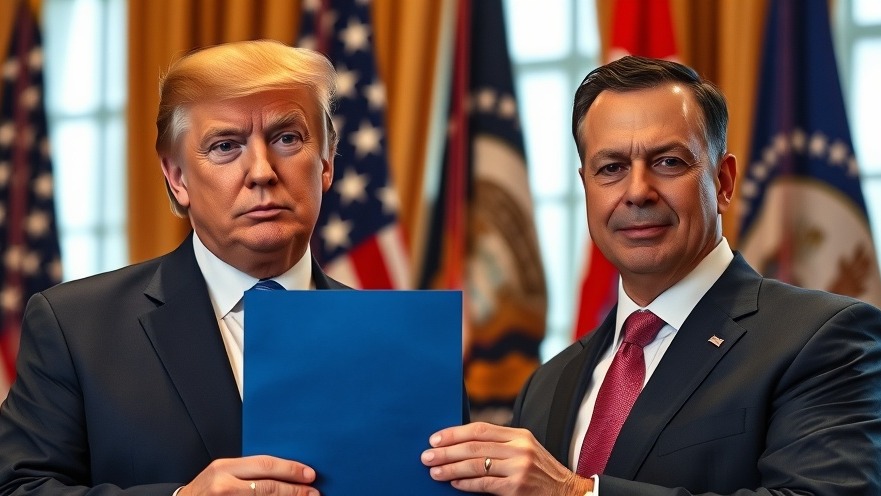
Trump’s Unconventional Influence on Argentine Politics
In a dramatic display of political influence, President Donald Trump has issued a stern warning to Argentina: align with U.S. interests or risk losing substantial financial support. This bold declaration came during a meeting with Javier Milei, Argentina’s president and staunch ally of Trump, amid preparations for critical midterm elections in Argentina. Such direct intervention in another country's electoral politics is rarely seen from U.S. presidents, marking a potential shift in diplomatic norms.
Argentina's Political Landscape: Key Elections Ahead
Argentina is set to host midterm elections that will not only affect its legislative landscape but also sever ties with international funding if the results do not favor Milei’s agenda. Describing opponents as "extremely far left," Trump made it clear that American generosity hinges on the outcomes of these elections. Historically, such threats have been uncommon from U.S. leaders, hinting at a deeper strategy to align foreign leadership with American policy goals.
The Role of Financial Aid in Foreign Affairs
Trump’s administration recently extended a lifeline of $20 billion to Argentina, claiming it is meant to bolster a neighboring country’s recovery and democratic ideals. Critics, however, argue that this aid is more about ensuring political loyalty than genuine support, raising questions about the ethics of using economic leverage in international relations. As Secretary of the Treasury Scott Bessent clarified, the U.S. believes that Milei’s government can reinforce economic reforms that resonate with American capitalism.
Controversy Brews Over Political Connections
The infusion of cash arrives at a pivotal moment for Milei, who is under pressure from citizens frustrated by inflation and unemployment rates. In this light, the upcoming midterms will serve as a referendum on both Milei’s and Trump's agendas. The warning from Trump indicates a potential abandonment of financial support should a less favorable government emerge, intensifying the pressure on Argentine voters and politicians alike.
Responses from the Argentine Opposition
Former President Cristina Fernández de Kirchner has voiced strong opposition, suggesting that Trump's intervention is not merely guidance but interference in Argentina's sovereignty. This reaction highlights the contentious nature of foreign influence in domestic politics, particularly regarding economic aid. Kirchner's calls for voters to understand the implications of Trump’s message have sparked debates about nationalism and economic dependence.
A Bromance with Consequences for Policy and Perception
Milei's praise for Trump—as he referred to the U.S. leader's policies as a great source of inspiration—demonstrates a unique diplomatic relationship that trusts personal connections over traditional alliances. This "bromance," as some analysts have termed it, has not only secured crucial funding for Argentina but also risks tarnishing the U.S.'s image on the world stage by appearing to prioritize loyalty over democratic principles.
The Intersection of Domestic Priorities and International Relations
Reactions to Trump’s policies in Argentina underscore the significant clash between domestic and foreign priorities. As Milei aims to stabilize the economy, the intricate dance of U.S. support versus reliance raises ethical questions about the true motivations behind international financial aid. The looming midterms may determine whether Argentina remains in line with U.S. interests or pivots toward a more leftist framework that Trump explicitly warns against.
The Bigger Picture: U.S. Aid's Impact on Global Politics
While Trump’s threats may serve short-term political aims, they could have long-term ramifications not only for Argentina but for U.S. relations with other nations as well. If countries perceive U.S. aid as conditional on political loyalty, it may alter future alliances and partnerships. This creates a precarious situation where foreign leaders may prioritize alignment over the needs of their own citizens.
Conclusion: What Lies Ahead for U.S.-Argentina Relations
As the situation continues to evolve, it raises critical questions about the role of economic support in shaping political landscapes. Voters in Argentina face a defining choice, while the implications of Trump's blunt diplomacy ripple across international borders. Understanding these dynamics is crucial for anyone interested in the future of global politics and the responsibilities that come with international aid.
 Add Element
Add Element  Add Row
Add Row 



Write A Comment